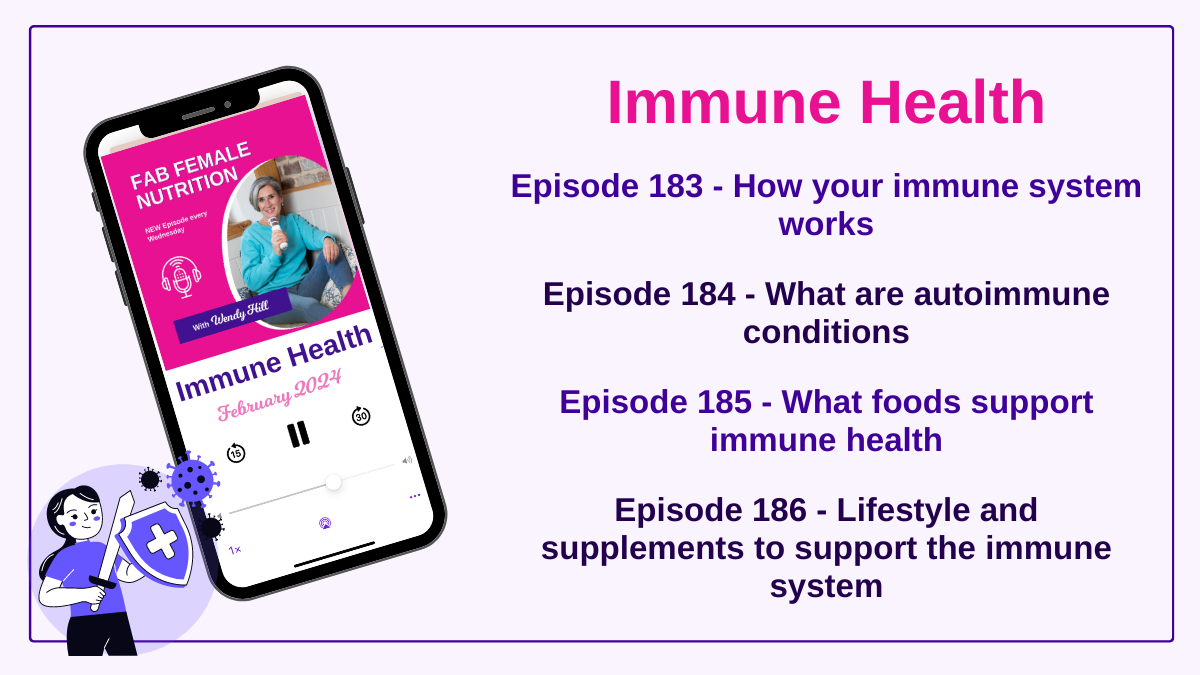Your immune system operates through a coordinated interplay of physical barriers, innate and adaptive immune responses. This is the most complex system in the body and ensuring it is working in harmony and balance is crucial to safeguarding the body against infections.
The key things you need to know to support and improve your immune system are:
- How your immune system works
- What autoimmune conditions are
- Foods that support your immune system
- Lifestyle and Supplements to support your immune system
Read on to find out more, and there is a bite-sized podcast episode for each too!
1. Understanding how your immune system works.
Our immune system is the most complex system in the body. It is like our army that is constantly monitoring and making decisions about whether substances are safe or not.
It is a complex network of cells, tissues, and organs working collaboratively to defend the body against pathogens. Interestingly over 70% is located in the gut. This makes sense as most substances are either breathed in or ingested, so they arrive first in our guts. However, we also have immune cells in our nose and our skin. We have them in every single part of our body.
First line of defence – the border soldiers
The first line of defence comprises of physical and chemical barriers, such as the skin and mucous membranes. These structures prevent the entry of pathogens into the body. The skin, in particular, serves as an amazing barrier due to its multilayered structure and the presence of antimicrobial substances.
The first line of defence are searching for anything that they think is foreign to the body, and they destroy it indiscriminately. The correct response is to attack then fall back, and when our systems are working in harmony and balance, they are effective and lethal. Think of them like our border force, they decide who can get in and destroy anything that they don’t want to allow through.
The second line of immune defence – is your adaptive immune system.
Should pathogens breach the initial defences, the second line of defence comes into play. This involves a more sophisticated and targeted response mediated by various immune cells. White blood cells, or leukocytes, are crucial components of this response. These cells are produced in the bone marrow and circulate in the blood and lymphatic system.
Lymph nodes, the spleen, and other lymphoid organs are strategically positioned hubs where immune cells congregate. The immune system adapts to specific pathogens through the development of immunological memory. This adaptive immune response, involving T and B lymphocytes, provides long-term protection against previously encountered pathogens.
To listen to podcast episode 183 released on 7th February click the link below
2. What are autoimmune conditions?
Usually, your immune cells can tell the difference between foreign cells and those of your own body. In autoimmune conditions, this mechanism goes haywire, and the immune cells mistakenly target the body’s own cells as if they were invaders. This self-attack is what we call an autoimmune response, and the resulting conditions are known as autoimmune diseases.
There are two types of autoimmune conditions; those that are genetically inherited, and then acquired autoimmune conditions that are believed to be triggered by environmental conditions in those that are genetically susceptible. Some will only attack one organ, and others may affect your whole body.
The immune system is the most complex in the body and we are still learning and understanding how it works. There are always exceptions, and each person is unique, we know that diet, genetics and lifestyle play an important part in whether someone develops the condition.
Some common genetic autoimmune conditions
- Type 1 diabetes – People with type 1 diabetes do not produce insulin as the body attacks the pancreas which is the organ that produces this hormone. Insulin is responsible for shuttling glucose from the blood and into the cells, sufferers have to inject insulin into the body to ensure that this is being done. Long term issues with diabetes include damage to the heart, kidneys, eyes and nerves.
- Rheumatoid arthritis (RA) – This often begins later in life, but not always, and some children suffer from this painful joint condition (referred to as juvenile idiopathic arthritis). In RA, the immune system attacks the joints, causing swelling, heat, soreness, and stiffness.
- Coeliac disease – when gluten is ingested in the small intestine the immune system attacks causing damage to the digestive lining as well as symptoms such as vomiting, diarrhea, constipation, and abdominal bleeding. Thought to affect about 1% of the population worldwide.
- Psoriasis – skin cells grow and shed, but in psoriasis, the cells multiply too quickly. These extra cells build up and form inflamed patches. Up to 30% of those with psoriasis go on to develop psoriatic arthritis with symptoms similar to that of RA.
- Multiple Sclerosis (MS) – damages the protective coating surrounding the nerve cells which slows down the transmission of messages between your brain and spinal cord from the rest of the body. This leads to numbness, weakness, balance issues an difficulty walking. Different forms of MS progress at different rates.
- Systemic lupus erythematosus (SLE) – originally thought to be a skin disease as it often has a rash, it is a systemic disease that affects many organs including joints, kidneys, brain and heart. Symptoms include joint pain, fatigue, and rashes.
- Inflammatory bowel disease (IBD) – not to be confused with IBS, this condition includes Crohn’s disease and ulcerative colitis both of which are severe inflammatory conditions that impair nutrient absorption and cause severe gastrointestinal pain.
- Addison’s disease – affects the adrenal glands which produce cortisol and DHEA. Cortisol is key in energy and severe weakness is a common sign, as well as low blood sugar and weight loss.
- Grave’s disease – attacks the thyroid gland, and thyroid hormones control the body’s metabolism. If you have too much then you can find you have a rapid heartbeat or unintentional weight loss, you may also experience swelling of the thyroid
- Hashimoto’s thyroiditis – when the thyroid gland, which controls metabolism, slows causing a deficiency in thyroid hormones. Often causing weight gain, fatigue, hair loss and swelling of the gland.
Normally, our immune system has a tolerance for our own cells. In autoimmune conditions, this tolerance breaks down, and the immune system loses its ability to distinguish between self and non-self. Inflammation is common which is why joint pain is often cited as a symptom of autoimmune conditions.
As our understanding grows there seems to be an increase in the number of conditions that we are considering to be autoimmune. Fibromyalgia and Chronic Fatigue Syndrome (CFS) are two that are thought to be driven by genetic and environmental factors, and as we learn more about COVID-19 we are seeing a rise in autoimmune conditions post infection.
To listen to podcast episode 184 released on 14th February the link below
3. What foods support our immune system health?
As we have already learned, we want our immune system to have an appropriate reaction to foreign invaders. Too much and autoimmune conditions may develop, too little and we get sick. We should be thinking about foods in terms of the ingredients or nutrients it provides to help build a strong immune system, and the nutrients it provides to help clear up any waste and repair any damage done.
Anti inflammatory foods
Inflammation is a key factor in keeping our immune system happy, so eating foods that reduce inflammation is key. These include colourful vegetables and fruit along with:
- Berries are great sources of vitamin C, natures natural antioxidant, they are also packed with antioxidants which have shown to support our immune function.
- Turmeric contains the active ingredient curcumin which in studies shown has as powerful anti inflammatory properties as ibuprofen, without the digestive side effects.
- Green tea is full of antioxidants and amino acids that support our immune system function.
- Ginger has antioxidant and anti inflammatory effects and has been shown to support gut health.
- Chicken soup in studies showed to help reduce the longevity of colds and support healing.
- Mushrooms are high in beta glucans which have been shown to support our immune system and reduce the occurrence of colds.
Immune system key nutrients
In studies we tend to look at the occurrence of the common cold and visits to our GP, this is because they tend to be frequent and easy to monitor. When our immune system is working efficiently, we shouldn’t be too affected by viruses such as colds, maybe you feel slightly aching or have a runny nose for a day or two, but when these things become recurrent or are difficult to shake off, it can be a sign of a poor functioning immune system.
Certain nutrients are key in supporting immune health:
- Zinc found in shellfish, eggs, wholegrains and pumpkin seeds. Helps by increasing the production of T-lymphocytes and regulating the function of white blood cells.
- Vitamin C – found in most fruits, particularly berries and vegetables particularly dark leafy greens. It stimulates lymphocytes and has antioxidant and antihistamine properties.
- Vitamin D – most of our vitamin D is manufactured in sunlight by the skin, which can be challenging in winter months. It can be difficult to get enough from the diet but is found in oily fish, butter, mushrooms and eggs.
- Selenium – increasing our intake of selenium has been shown to improve our immune response. Sources of selenium depend on the selenium content of soil and food but can be found in brazil nuts, oily fish, eggs and seaweed.
What might an immune supporting day look like?
Breakfast might consist of oats topped with berries and pumpkin seeds, lunch could be chicken soup followed by some brazil nuts and dark chocolate. For your evening meal how about a bowl of shellfish risotto with a big side salad?
When we eat real, whole and seasonal foods it is easy to eat a diet that is rich in the ingredients we need to support our overall health. The key is to give the body what it needs to support itself.
To listen to podcast episode 185 released on 21st February click the link below
html libsyn4. How can lifestyle and supplements support our immune system?
Ideally we want to be eating a wide a varied diet, which will provide our body with the nutrients it needs. However if you, or someone in your family, doesn’t eat a varied diet they may need additional support. Also it can be helpful to increase certain foods or supplements to help the body deal with the virus.
Our lifestyle also has a big impact on our health and wellbeing, including stress and the health of our digestive system.
My favourite immune-supporting supplements
Our podcast is sponsored by my favourite vitamin complex company and from their range I would choose Zest Active as my immune hero. It not only has good levels of vitamin D, and low levels of this vitamin have been associated with all-cause mortality from illness, it has vitamin E, A and C. Vitamin C is a natural antioxidant and is key in the health of our immune system. It also contains Beta Glucans found in the cell walls of plants, some yeasts, bacteria, fungi and algae they are considered to be immunomodulators, managing the response to threat.
Should you get an infection then the cheapest and best form of antioxidant is Vitamin C, and my preferred brand is Biocare. You can take a high dose of 1000mg three times a day to top up your levels and help reduce inflammation and bring your immune system back down after an attack.
Echinacea has been shown to reduce the longevity of the common cold, you can find it in lots of herbal teas and in some natural tinctures. My favourite is to have a cup of Pukka tea* as it soothes both the body and the mind. My top tip is to infuse with your cup covered so you get the maximum benefit from the herbs.
In winter months it is impossible in the UK (where I live) to get adequate levels of vitamin D, so it is advisable to take a supplement. As a woman in mid-life my bone health is important to me, and vitamin D supports absorption of calcium in the gut. Vitamin K2 is a cofactor in this process which is why my preferred supplement is a combination of these two by Cytoplan.
*use code WHILL10 at checkout to get 10% off your purchase
Gut health is key
If 70% of our immune system is located in the gut, gut health is key to supporting our immune health.
I run a regular group program called The Transformation Program which is based on a gut healing protocol. It helps reduce inflammation to calm the immune system along with giving the digestive system the space and nutrients it needs to heal. Click the link to find out when the next program is running.
Also eating a wide range of prebiotic foods such as yoghurt, sauerkraut, kimchi and kefir can help repopulate the microbiome and improve the health of your digestive system. If you feel that your system is damaged or oversensitive it is always advisable to speak to a professional who can advise you on the right course of action to suit your specific needs..
Reduce stress to improve immune health
As our body believes we are in danger when cortisol is high, our immune system will also be on hyper-alert. This is because we cannot afford to get ill if we are running away from danger. Of course our immune system does not know that cortisol is high because you are working late, or reacting to phone notifications when you should be sleeping.
This is a modern phenomenon and research is still new in this field, but it is thought that the ever-increasing pressures we are putting ourselves under are driving an increase in autoimmune conditions.
Prioritising sleep is a good start in helping the body regulate cortisol. Along with having better boundaries, and practising calming exercise such as yoga, walking or meditation.
To listen to podcast episode 186 released on 28th February click the link below
html libsynDid you enjoy the topic of these episodes, have you got any feedback or questions? Please reach out to me via my social media channels, I’d love to hear from you. And don’t forget to subscribe to the podcast so that you don’t miss an episode.
My links
A note about our sponsor
Revive Active, Ireland’s leading Super Supplement Brand, we are proud to have them as sponsors of this podcast as their formulas stand out as a powerhouse of premium ingredients, working together in perfect harmony to bring you optimum benefits.
Revive Active is committed to selecting components that not only enhance your vitality but also cater to your specific needs. Every ingredient is carefully chosen for its efficacy and is supported by rigorous scientific research. Revive Active believes in transparency. What you see on the label is what you get – no hidden ingredients or undisclosed fillers, binders, caffeine, or stimulants. Convenience meets effectiveness in every sachet, from radiant skin to boosted energy levels, each formula is designed to enhance your overall well-being.
My favourites from their range
REVIVE ACTIVE is a powerhouse of 26 active ingredients—your essential replenishment for what life takes out with the support of HERO ingredients like CoQ10 for cellular energy, Citrulline DL Malate to fight fatigue and support heart health, and L-Arginine for active blood flow.
Meet MASTERMIND, your brain’s secret weapon! This specially formulated supplement supports brain function with a potent mix of 7 vitamins, 1 mineral, Omega 3 DHA, Uridine, and Choline—all in one handy sachet. Enhance mental focus, and beat that mid afternoon slump without interfering with your sleep, this is your maximum productivity and focus tool. Plus, it’s Vegetarian, Gluten-Free, and Halal Certified.
BEAUTY COMPLEX, one of the award-winning super supplements, boasts 8 potent ingredients in one easy, convenient sachet. Featuring Type 1 Marine Collagen, Hyaluronic Acid, Phytoceramides and Biotin, the synergy of these HERO ingredients goes beyond aesthetics, aiming to reduce visible signs of aging and enhance your overall look and feel. Beauty, indeed, starts from within.
Embrace menopause fearlessly with MENO ACTIVE—a product backed by over two years of dedicated research. This unique blend of 31 active ingredients, including 12 vitamins, 7 minerals, 4 plant extracts, Omega 3 DHA and more, is designed to support you during this transformative journey of change. With a daily sachet and capsule, it’s a powerful combination to navigate the menopausal phase with ease. Meno Active is your empathetic companion for a smoother transition.
Join me and countless women who have made Revive Active an integral part of their daily routine, experiencing a positive impact on their health and overall well-being.
Want to know more about ways to work with me?
There are many ways that you can work with me to balance your hormones and improve your health and wellbeing.
On Facebook the Fab Female Nutrition Club is a wonderful FREE community where I offer lots of support and advice on female health and wellbeing. I also love to cook and create recipes and I’ll often be seen in the group cooking live and sharing all the wonderful health benefits of the ingredients used.
My Fab Female Nutrition Membership sits alongside the free club, but offers you lots of resources and group coaching with me. The hub has the full recipe book that is constantly being updated, the 5 elements of health containing resources and guides to help support you in your health journey. And 6 group coaching calls a year, plus access to other member benefits such as discounts from group programs.
A few times a year I work with groups of ladies to transform their health and wellbeing. Appropriately called The Transformation Program it can help with many differing issues and we have had hugely impressive results – including up to 100% reduction in symptoms. If you suffer with IBS, fatigue, inflammation, hormonal imbalances or just want to spend some time concentrating on your health and wellbeing they are fabulous value and great fun.
If you feel like you need a more bespoke option, then my 1:1 coaching and testing is for you. We will concentrate on your specific needs creating nutritional protocols that support your health goals. We take a full health history, then tailor testing to help create and refine protocols so that you learn about your body and how to support it. I will be with you every step of the way to guide you and ensure that you realise your true health potential. Find out more here.




